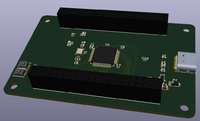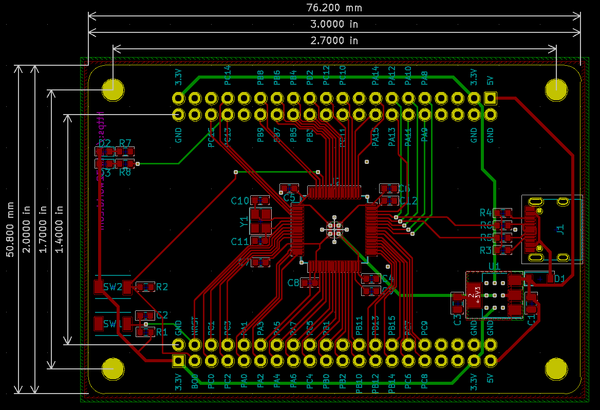Difference between revisions of "STM32World"
| Line 266: | Line 266: | ||
| | | | ||
| PC15 | | PC15 | ||
| + | | 76 | ||
| + | | 75 | ||
| U7 | | U7 | ||
| | | | ||
| Line 271: | Line 273: | ||
| | | | ||
| U10 | | U10 | ||
| + | | 74 | ||
| + | | 73 | ||
| U9 | | U9 | ||
| | | | ||
| Line 276: | Line 280: | ||
| | | | ||
| PB9 | | PB9 | ||
| + | | 72 | ||
| + | | 71 | ||
| PB8 | | PB8 | ||
| | | | ||
| Line 281: | Line 287: | ||
| | | | ||
| PB7 | | PB7 | ||
| + | | 70 | ||
| + | | 69 | ||
| PB6 | | PB6 | ||
| | | | ||
| Line 286: | Line 294: | ||
| | | | ||
| PB5 | | PB5 | ||
| + | | 68 | ||
| + | | 67 | ||
| PB4 | | PB4 | ||
| | | | ||
| Line 291: | Line 301: | ||
| | | | ||
| PB3 | | PB3 | ||
| + | | 66 | ||
| + | | 65 | ||
| PB2 | | PB2 | ||
| | | | ||
| Line 296: | Line 308: | ||
| | | | ||
| U8 | | U8 | ||
| + | | 64 | ||
| + | | 63 | ||
| PC12 | | PC12 | ||
| | | | ||
| Line 301: | Line 315: | ||
| | | | ||
| PC11 | | PC11 | ||
| + | | 62 | ||
| + | | 61 | ||
| PC10 | | PC10 | ||
| | | | ||
| Line 306: | Line 322: | ||
| | | | ||
| U12 | | U12 | ||
| + | | 60 | ||
| + | | 59 | ||
| U11 | | U11 | ||
| | | | ||
Revision as of 03:51, 5 May 2022
STM32World is a series of development boards designed for rapid development and prototyping.
The idea is to have MCU boards available with multiple MCU's (possibly including non ST ones such as the ones from GigaDevice).
The boards will be stackable but rather than trying to cram every single imaginable device into every board, these will be deliberately kept simple. A CAN transceiver board will include a CAN transceiver and nothing else.
As much as possible, peripheral board will be designed in such a way that they will not conflict with each other, even though this might not be possible to achieve 100 %.
All files for hardware and software is available at STM32World Github Repository
Form Factor
STM32World boards are meant to be stackable.
All boards are 3" x 2". In many cases this is much bigger than needed but PCB's are cheap and having the boards at that size makes layout much easier.
Board Ideas
| Name | Type | Description | Status | |
|---|---|---|---|---|
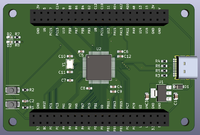
|
MCUSTM32F405 | MCU | MCU Board using the STM32F405 MCU | Under development |
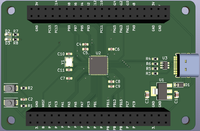
|
MCUSTM32F411 | MCU | MCU Board using the STM32F411 MCU | Under development |
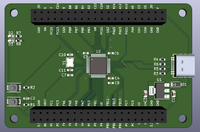
|
MCUSTM32F103 | MCU | MCU Board using the STM32F103 MCU | Under development |

|
MCUGD32F405 | MCU | MCU Board using the GD32F405 MCU | Under development |
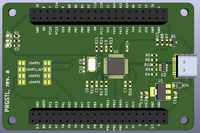
|
PRGSTL | Programmer | Board designed like a ST-Link/V2.1 device | Under development |
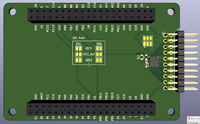
|
IOAW9523 | I/O | I²C AW9523 based GPIO Expander and LED driver | Under development |
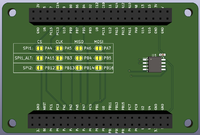
|
MEMW25Q128 | Storage | W25Q128 SPI Serial Flash | Under development |
| HID01 | Display/Keyboard | Display and touch keyboard | Under development | |
| DWS2812 | Display | WS2812B RGB LED Array | Under development |
Pin Use
The STM32 processors are not 100 % flexible in mapping I/O pins, so certain peripherals can only be mapped to certain pins. Because of that, some of our board will conflict with each other.
|
|
Board Specific
| Pin | MCUSTM32F405 | Remarks |
|---|---|---|
| PA0 | ||
| PA1 | ||
| PA2 | ||
| PA3 | ||
| PA4 | ||
| PA5 | ||
| PA6 | ||
| PA7 | ||
| PA8 | ||
| PA9 | ||
| PA10 | ||
| PA11 | D- | |
| PA12 | D+ | |
| PA13 | ||
| PA14 | ||
| PA15 | ||
| PB0 | ||
| PB1 | ||
| PB2 | ||
| PB3 | ||
| PB4 | ||
| PB5 | ||
| PB6 | ||
| PB7 | ||
| PB8 | ||
| PB9 | ||
| PB10 | ||
| PB11 | ||
| PB12 | ||
| PB13 | ||
| PB14 | ||
| PB15 | ||
| PC0 | ||
| PC1 | ||
| PC2 | ||
| PC3 | ||
| PC4 | ||
| PC5 | ||
| PC6 | ||
| PC7 | ||
| PC8 | ||
| PC9 | ||
| PC10 | ||
| PC11 | ||
| PC12 | ||
| PC13 | ||
| PC14 | ||
| PC15 |
